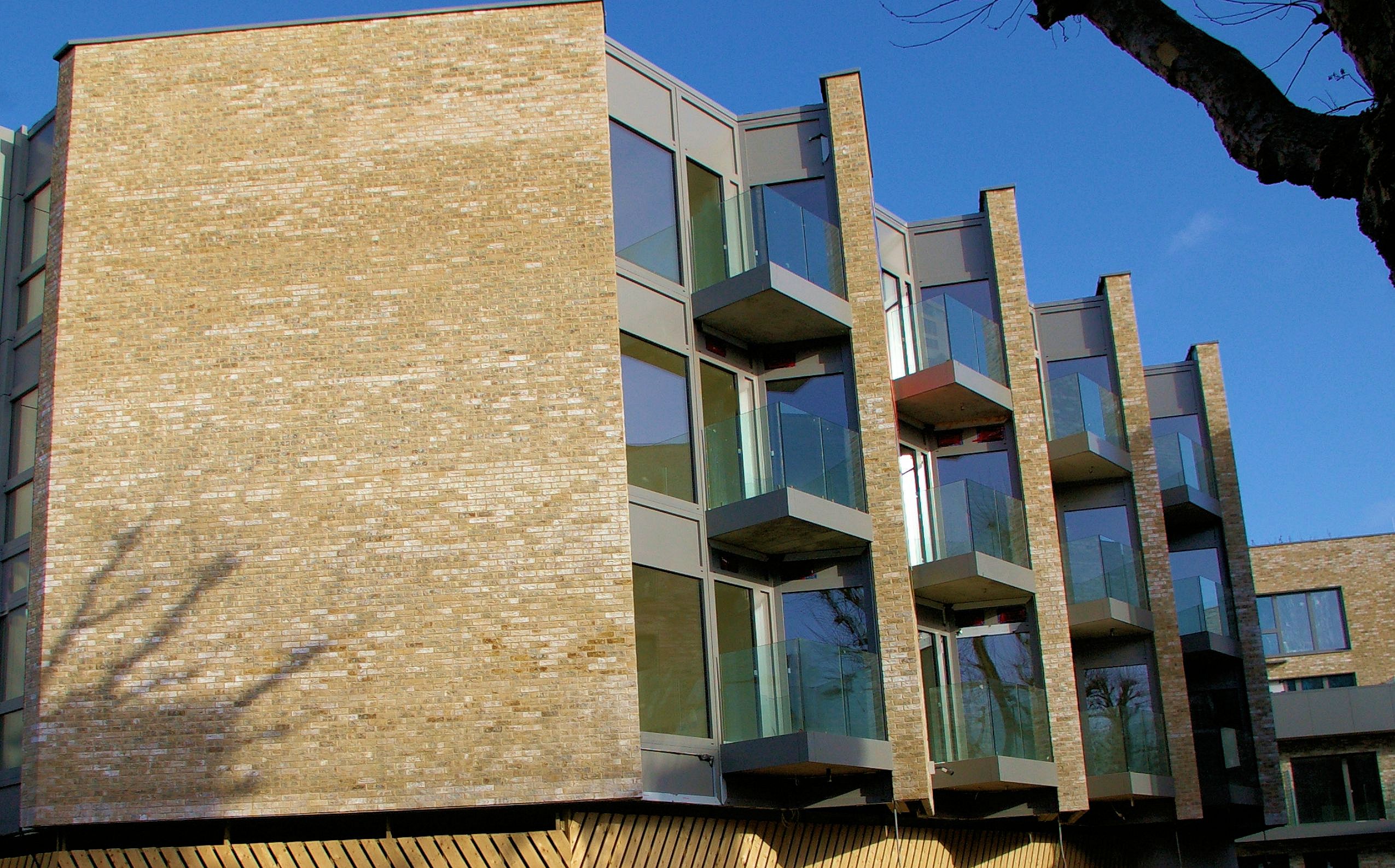
Isokorb specified for Passivhaus residential scheme
CASE STUDY: Chester Balmore project
Isokorb specified for Passivhaus residential scheme – Chester Balmore project, near Highgate in North London
The Chester Balmore project, near Highgate in North London, is part of Camden Councils community investment programme and will deliver 53 new homes, a GP surgery and shops.
Once a 1970s estate, the previous blocks on Chester Road and Balmore Street were in poor condition and refurbishment was not a cost-effective option.
Rick Mather Architects developed the project, which consists of three elegant brick-clad blocks, housing a contemporary collection of studios and one to three bedroom flats, all set around a landscaped courtyard.
- UKs largest residential scheme so far to meet the Passivhaus standard
- energy costs throughout the development reduced by up to 75 per cent
Minimal thermal bridges helps achieve Passivhaus standard
To achieve Passivhaus standard, property at design stage must show high levels of insulation with good use of solar and internal heat gains, plus excellent air tightness and minimal thermal bridges which are a frequent cause of increased heat and energy loss, damp walls and mould formation.
One of the most technically advanced countermeasures against thermal bridging is the Isokorb range from Schöck. It not only thermally separates components from one another, but also acts in a structural design capacity as well.
Example of balcony connection detail for the Chester Balmore project
Isokorb type XT for concrete-to-concrete applications
The particular Schöck thermal break module specified for this Passivhaus scheme is the latest generation Isokorb for concrete-to-concrete applications the type XT for which the Passivhaus Institute in Darmstadt has awarded the low thermal bridge construction certificate and confirmed its suitability for Passivhaus construction.
A major reason for the superior performance of the type XT is the thickness of the insulation body. This is increased from the standard 80mm thick to 120mm, providing an even more efficient solution. The type XT not only improves thermal insulation performance by up to 30% in comparison to to the standard range, it also improves impact sound insulation by around 50% as well.
High quality stainless steel bars with improved tensile strength is an integral part of the unit and while the same load-bearing capacity is maintained, there is a smaller rod diameter and therefore a reduction in the thermally conducting cross-section, resulting in a further increase in the heat insulation performance.
Tim Paul from Rick Mather: Balconies offer practical and aesthetic advantages for residents, but they have not always been a popular choice in the context of high efficiency Passivhaus design. However, the advanced technology and superior performance of the Schöck Isokorb XT range offers such a high level of insulation, that we had no problem in incorporating balcony design into the Chester Balmore project
The Schöck design team is always on hand to provide specifiers, structural engineers and contractors with a high level of technical support. Additionally, this now includes a discretionary in-house thermal-modelling capability, a service utilised very effectively for the Chester Balmore project.
Meeting minimum standard requirement for balconies
The type XT has already seen considerable success in Germany, not least for its sound insulation characteristics. For the first time in Germany there is now a stated minimum standard requirement for balconies. Previously this only applied to covered balconies, but the Schöck Isokorb XT has the advantage that it conforms to the minimum requirements for impact sound protection without any additional floating flooring on the balconies or covered balconies.
The Isokorb range enables connections to be made between concrete-to-concrete, concrete-to-steel and steel-to-steel and the many different unit types available, combined with their ability to enable the transmission of shear, bending moment, tension and compression forces, also means that the options available effectively run into hundreds when the different combinations are taken into account.
All units provide BBA Certification and LABC Registration and meet full compliance with the relevant UK building regulations. The requirement described in BRE IP1/06 a document cited in Building Regulations Approved Documents Part L1 and L2 and Section 6 in Scotland that the temperature factor used to indicate condensation risk (fRSI) must be greater than, or equal to, 0.75 for residential buildings, is easily met by incorporating the Isokorb.
In addition, there is also compliance with the Government Standard Assessment Procedure, SAP 2012, concerning CO2 emissions from buildings and respectively heat losses through non-repeating thermal bridges. Here, the lambda values of the Schöck Isokorb enable energy loss in various connective situations to be reduced by as much as 84% to 91%.
Schock
The Clock Tower
2-4 High Street
Kidlington
OX5 2DH
UK
Phone
0845 241 3390
Fax
0845 241 3391
Visit Supplier's page
Latest news

21st February 2025
ASSA ABLOY EMEIA: Save valuable time and money with a seamless switch to programmable digital keys
In 2025, access management can be a whole lot easier. By making access part of their digital processes, businesses can put time-consuming key management and the cost of changing the locks firmly behind them. Making this switch is a lot easier than many people think, as ASSA ABLOY explains here…
Posted in Access Control & Door Entry Systems, Architectural Ironmongery, Articles, Building Industry News, Building Products & Structures, Building Services, Doors, Facility Management & Building Services, Health & Safety, Information Technology, Innovations & New Products, Retrofit & Renovation, Security and Fire Protection
21st February 2025
Showersave supports industry leaders in addressing Part L and Part G regulations
Showersave has sponsored and participated in a recent Building Insights LIVE roundtable on ‘Water & Energy Saving Innovations in New Build Housing’.
Posted in Articles, Bathrooms & Toilets, Bathrooms, Bedrooms & Washrooms, Building Associations & Institutes, Building Industry Events, Building Industry News, Building Products & Structures, Building Regulations & Accreditations, Building Services, Exhibitions and Conferences, Interiors, Pipes & Fittings, Plumbing, Retrofit & Renovation, Sustainability & Energy Efficiency
21st February 2025
GEZE: The importance of Specifying High Quality Door Closers on Fire Doors
Andy Howland, Sales & Marketing Director at GEZE UK, discusses why specifying high quality door closers on fire doors is important…
Posted in Access Control & Door Entry Systems, Accessibility, Architectural Ironmongery, Articles, Building Industry News, Building Products & Structures, Building Regulations & Accreditations, Building Services, Doors, Facility Management & Building Services, Health & Safety, Posts, Restoration & Refurbishment, Retrofit & Renovation, Security and Fire Protection
21st February 2025
Insight Data achieves ISO9001 recertification with zero non-conformities
Leading industry data specialist, Insight Data, has successfully achieved the prestigious recertification for ISO9001 with zero non-conformities for the fourth consecutive year.
Posted in Articles, Building Industry News, Building Regulations & Accreditations, Building Services, Information Technology, Research & Materials Testing
 Sign up:
Sign up: